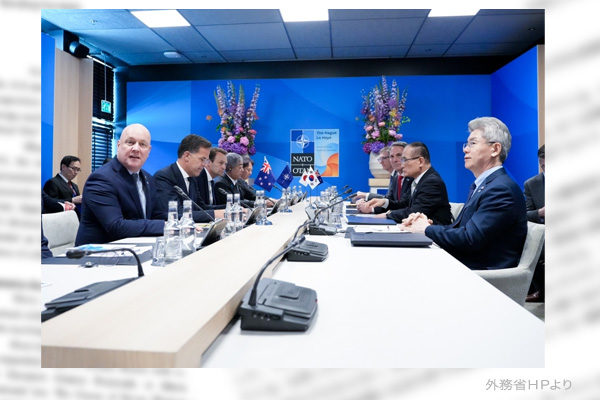Wasn’t Japan playing a leading role in deepening cooperation between the North Atlantic Treaty Organization and its Indo-Pacific partners? Prime Minister Shigeru Ishiba was invited to a June 24-25 NATO summit in The Hague, the Netherlands, but he withdrew from attending the meeting at the last minute.
NATO countries, as exemplified by Germany, have tended to prioritize China’s huge market. In response, the Japanese government began strengthening security cooperation with NATO, and former Prime Minister Fumio Kishida attended the NATO summit for three consecutive years.
Ishiba followed this approach and told NATO Secretary-General Mark Rutte during his Japan visit in April that the need for security cooperation among NATO and Indo-Pacific partners, including Japan, has increased even further. Rutte welcomed Ishiba’s stance.
Failing to show Japan’s presence at NATO summit
According to Japanese government officials, the four NATO Indo-Pacific partners of Japan, South Korea, Australia, and New Zealand tried to arrange their leaders’ meetings with U.S. President Donald Trump and Rutte. As it turned out difficult to hold a meeting with Trump during Ishiba’s stay, the prime minister canceled his trip, the officials said.
Ishiba canceled it partly because Australia and South Korea also decided not to send their leaders. However, even though the South Korean and Australian leaders were absent from the NATO summit, Ishiba should have attended the meeting to show Japan’s presence, instead of sending Foreign Minister Takeshi Iwaya to the meeting.
Japan-U.S. 2-plus-2 also postponed
NATO at the summit set a goal of increasing defense spending as a percentage of gross domestic product to 5%. As the U.S. Department of Defense has urged Asian allies, including Japan, to set the same goal, some observers believe that Ishiba withheld his presence at the NATO summit to prevent Japan’s defense spending increase from being highlighted at the meeting.
The U.S.-Japan Security Consultative Committee (2-plus-2) meeting of foreign and defense ministers scheduled for July 1 in the United States has also been postponed. The Financial Times reported that the reason for the postponement was that the U.S. government asked Japan to increase defense spending. Japanese officials explained that there was no specific U.S. request for an increase in defense spending and that the defense spending issue was not the reason for the 2-plus-2 postponement.
Even if this is the case, Ishiba and his government should directly convey to the public that further increases in defense spending are unavoidable at a time when the security environment surrounding Japan is the most severe and complex since the end of World War II, as noted in the Defense Ministry’s annual white paper last year.
Since the defense spending issue is directly linked to a tax hike, the government may want to avoid the issue to be highlighted before the House of Councilors election in July. But such a way of thinking amounts to ridiculing the public. Shouldn’t the election campaigns be an opportunity for the Ishiba government to persuade the public to support a defense spending increase by arguing that the increase is unavoidable to strengthen defense capabilities?
Takashi Arimoto is a Planning Committee member at the Japan Institute for National Fundamentals and a columnist at the Sankei Shimbun newspaper.


